Poem in Your Pocket Day 2022
Poem in Your Pocket Day – April 29, 2022 – is an international movement that encourages people to centre poetry within their daily interactions. On PIYP Day, select a poem, carry it with you, and share it with others at schools, bookstores, libraries, parks, workplaces, coffee shops, street corners, and on social media using the hashtag #PocketPoem.
This annual initiative is organized by the Academy of American Poets, celebrated with a free downloadable PDF booklet containing contemporary American and – since the League joined forces in 2016 – Canadian poetry to share.
For your French pocket poem needs, check out the booklet created by La poésie partout for La Journée du poème à porter.
The 2022 Poem in Your Pocket Poets are: Ashley Elizabeth Best, Jaclyn Piudik, Keith Inman, Maureen Hynes, Bänoo Zan, Angela Cen, Callista Markotich, Harry Posner, Mark Kim, Annick MacAskill, Amy LeBlanc, Frances Boyle, Anna Yin and Marlene Grand Maitre.
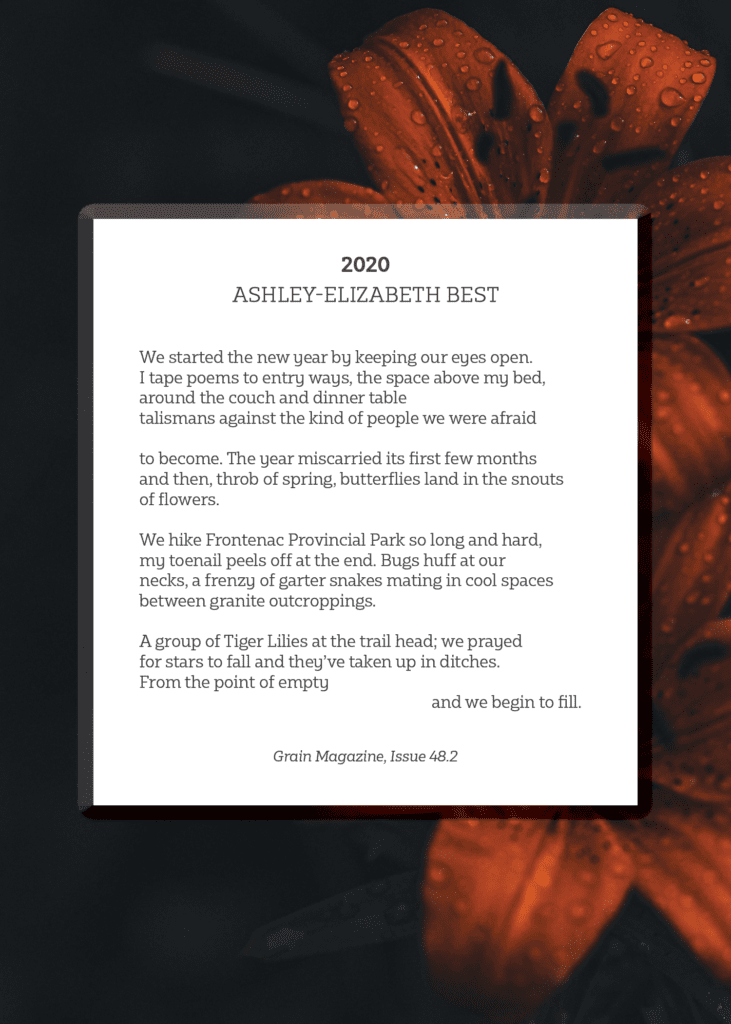
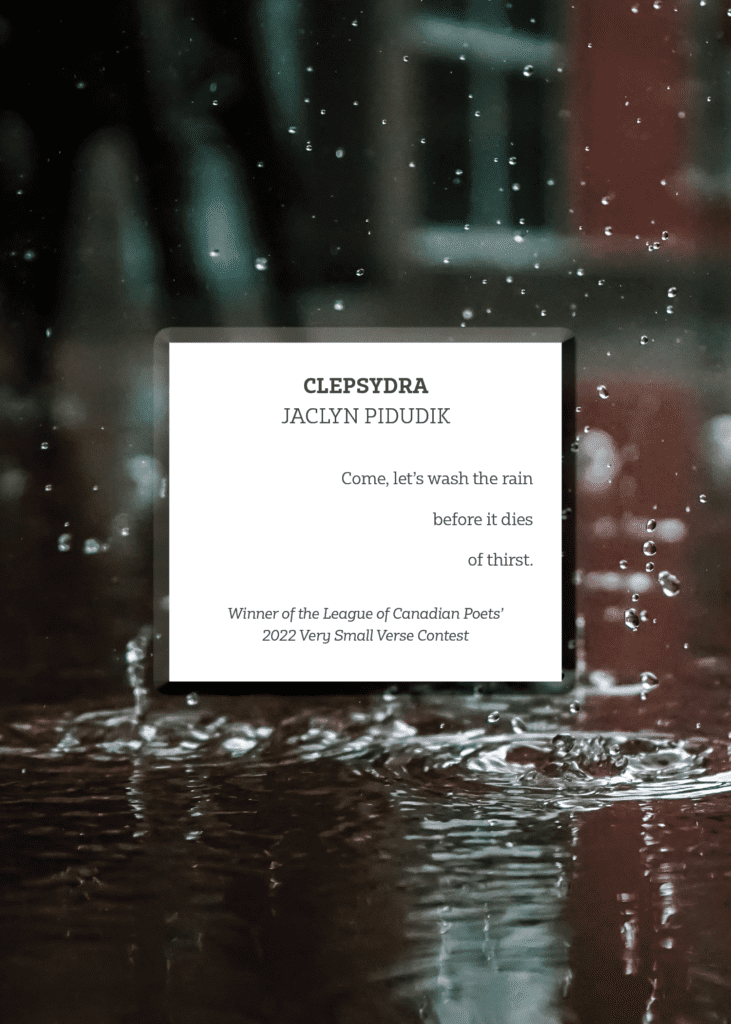
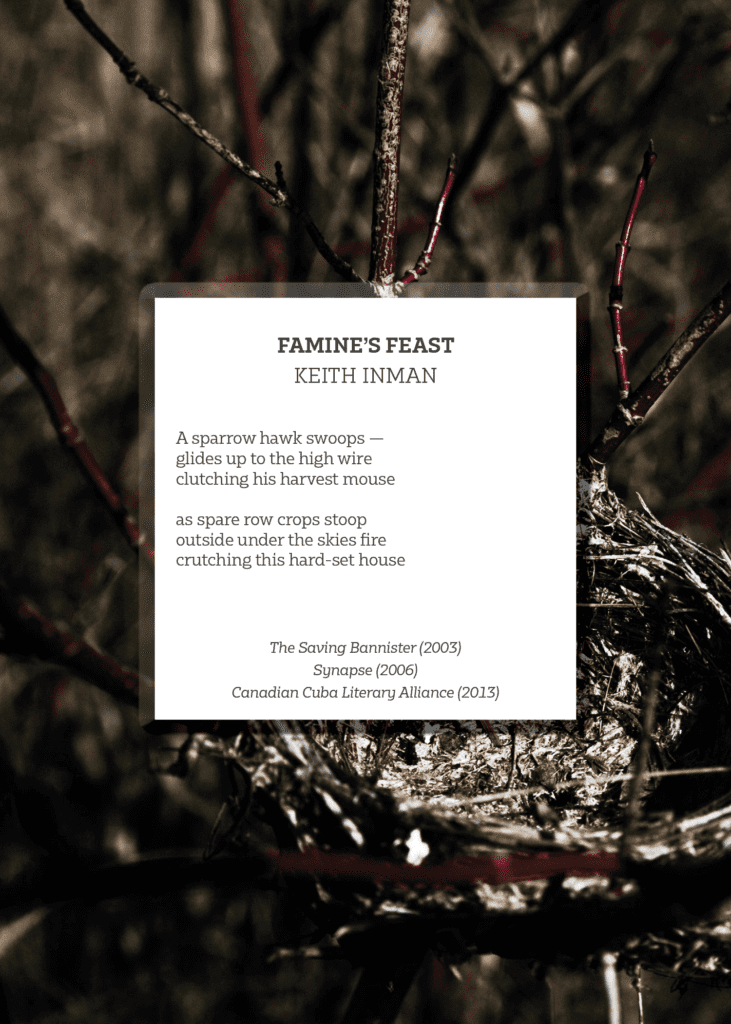
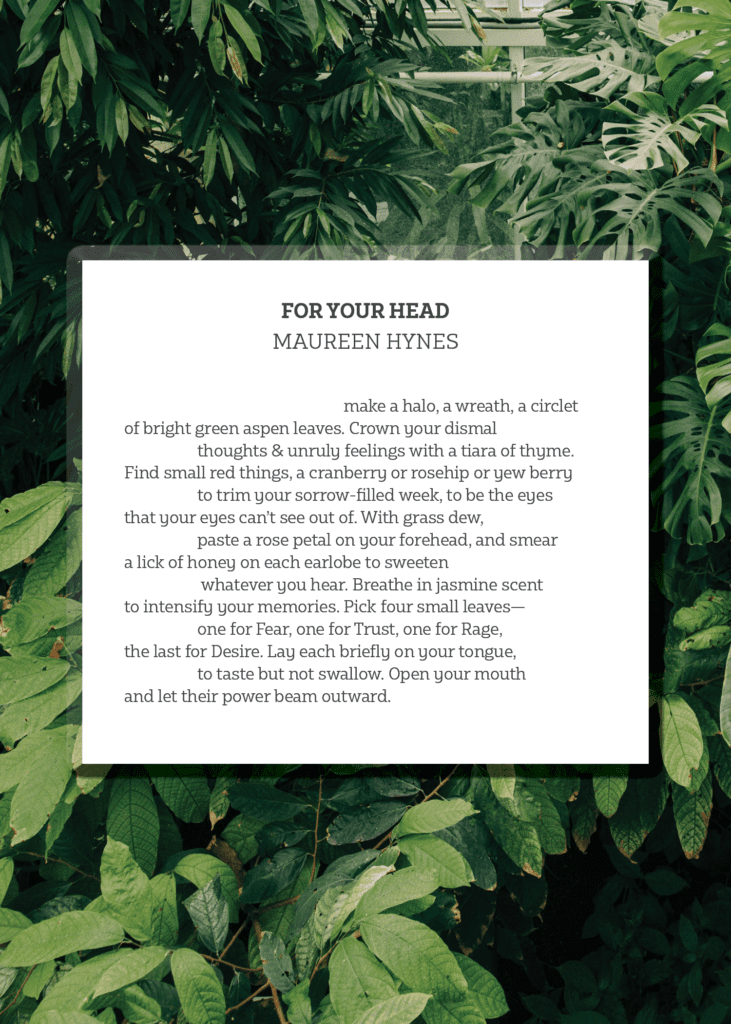
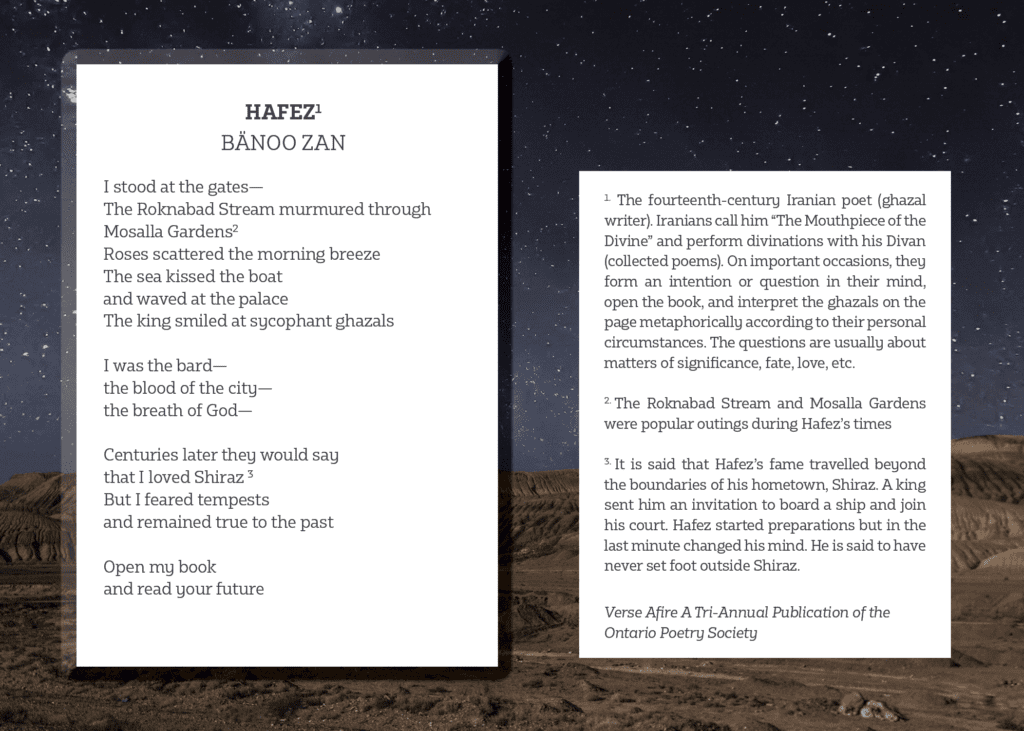
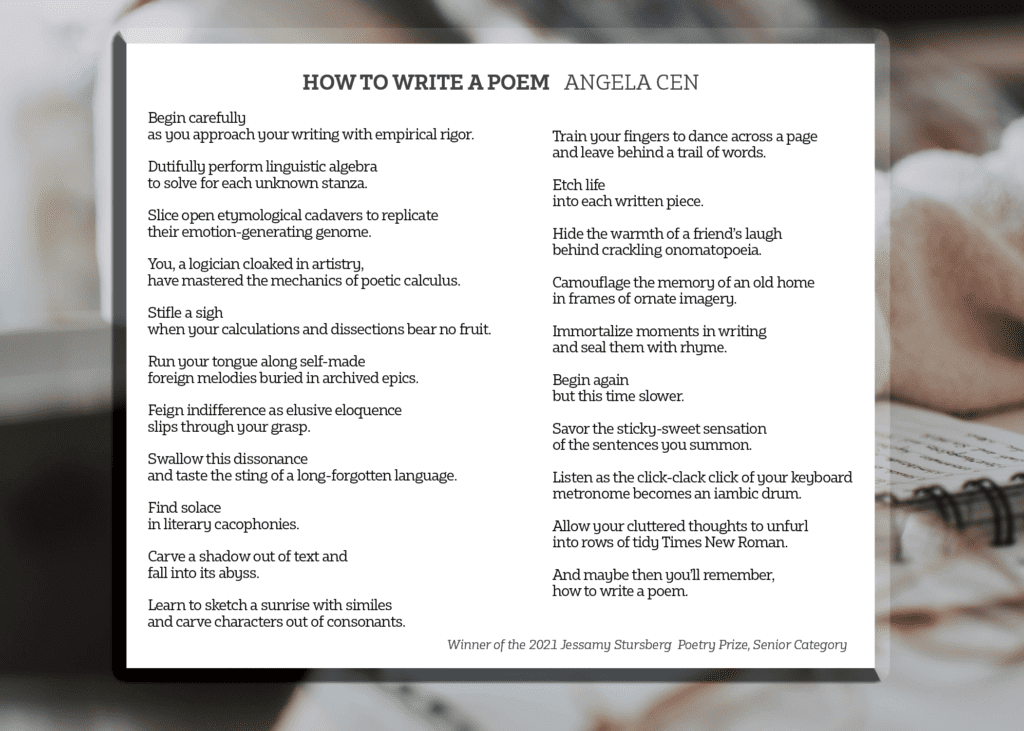
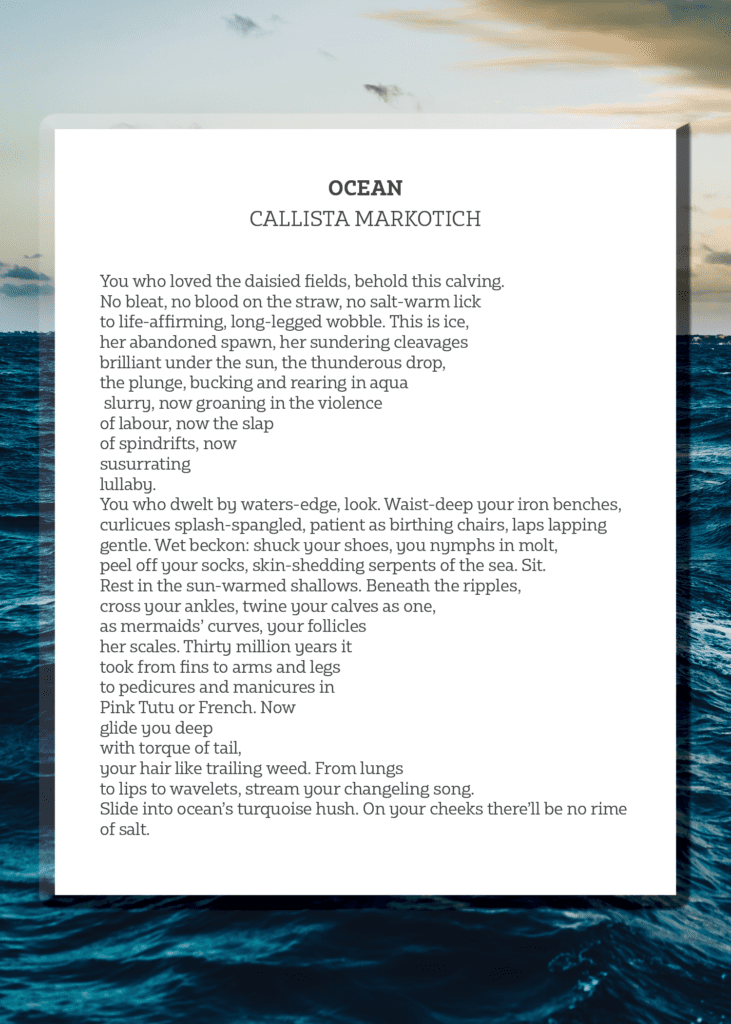
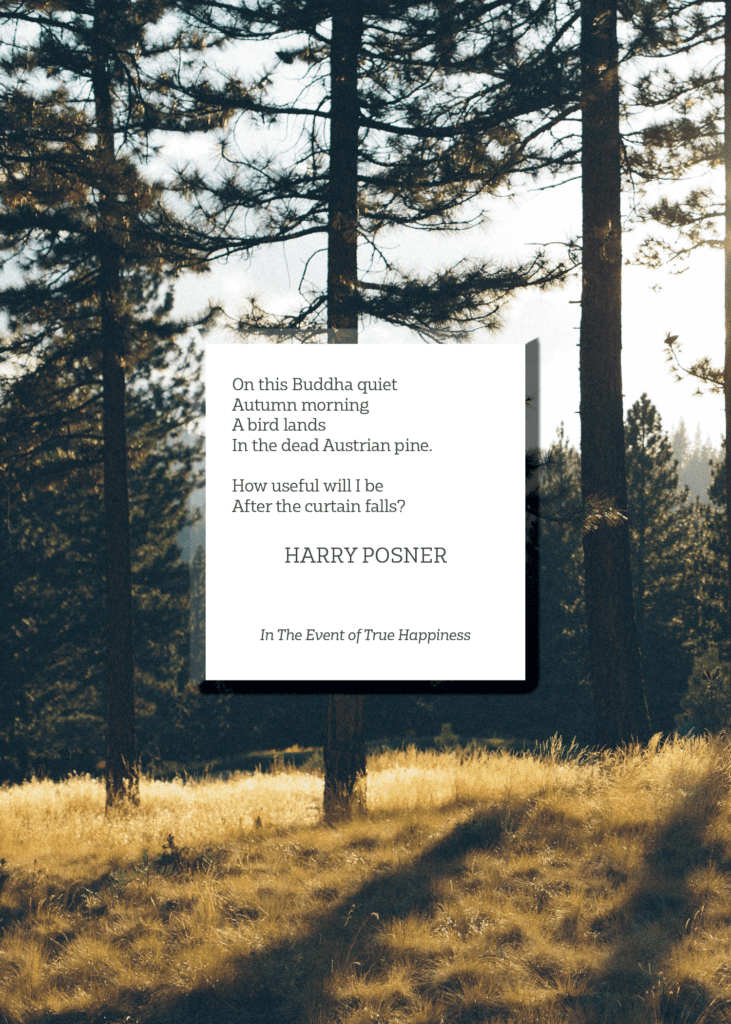
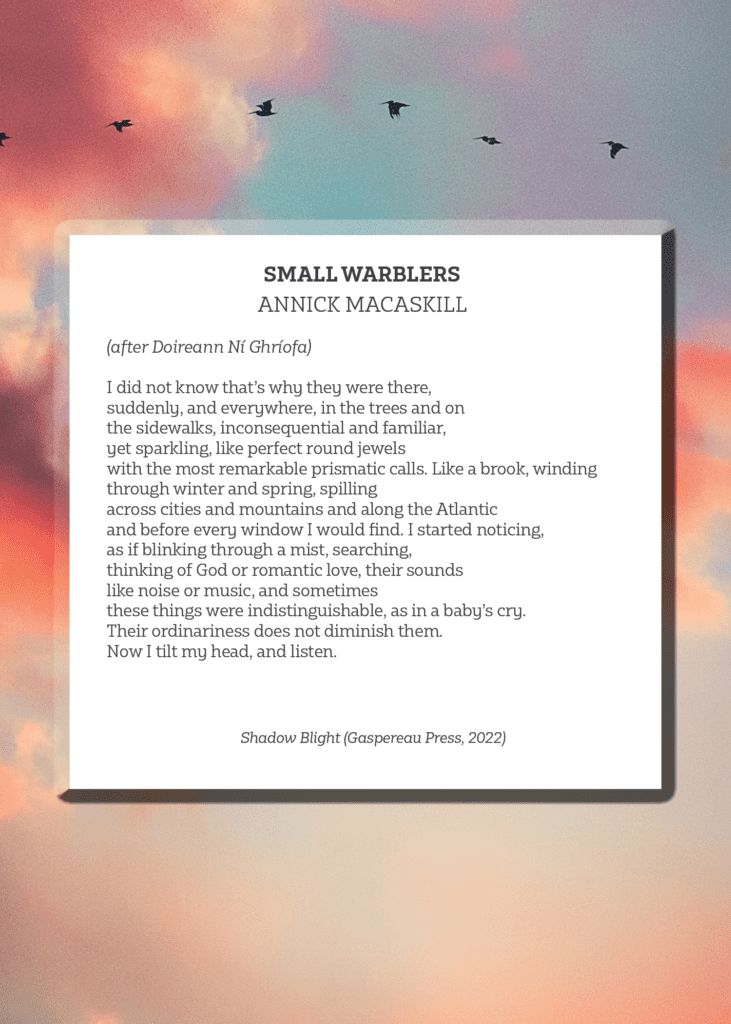
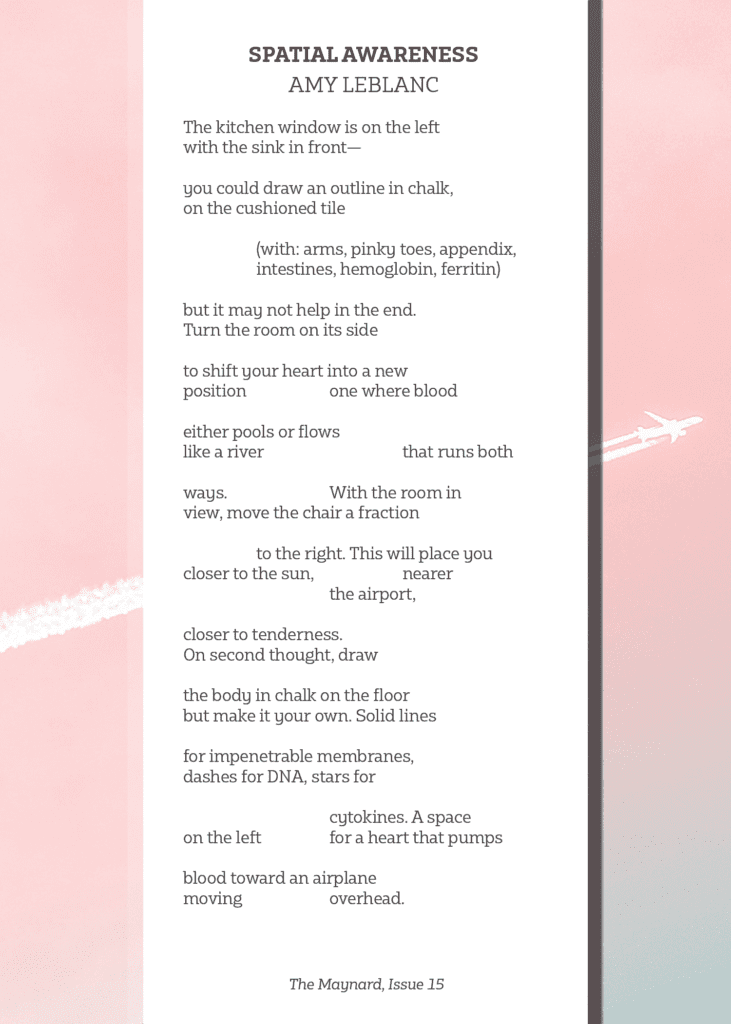
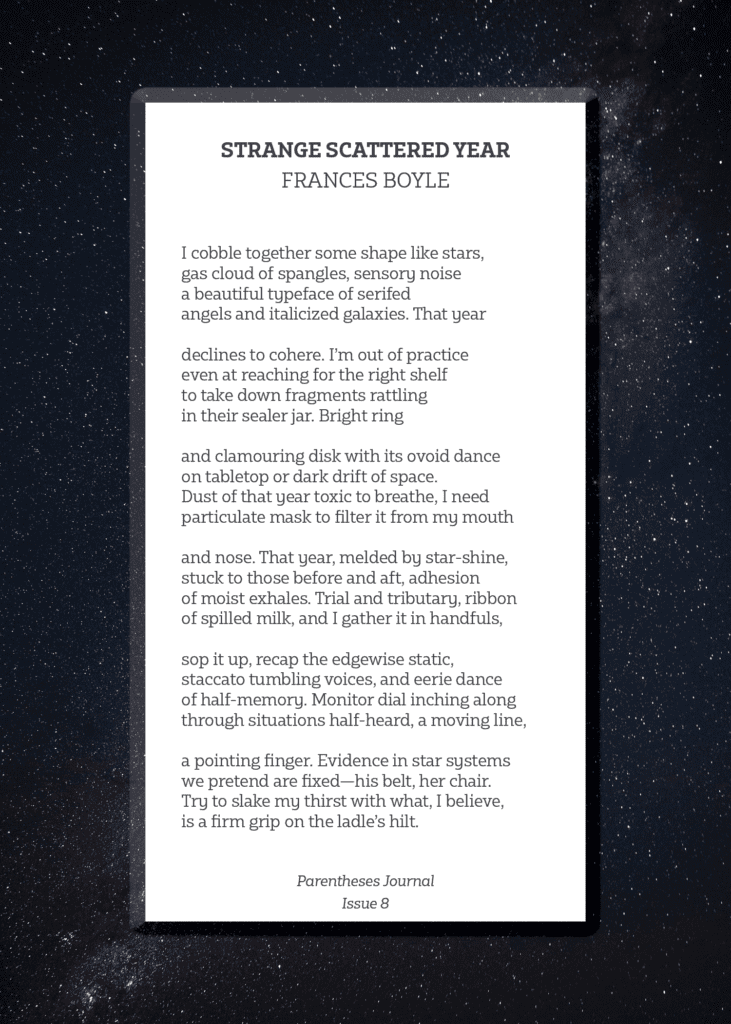
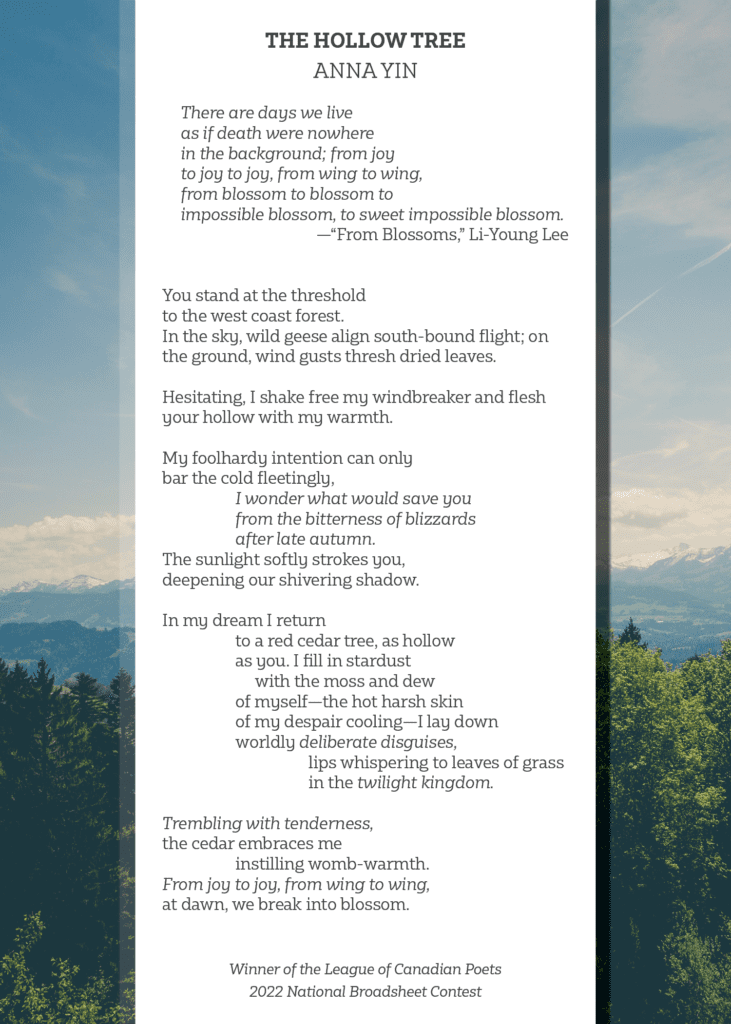
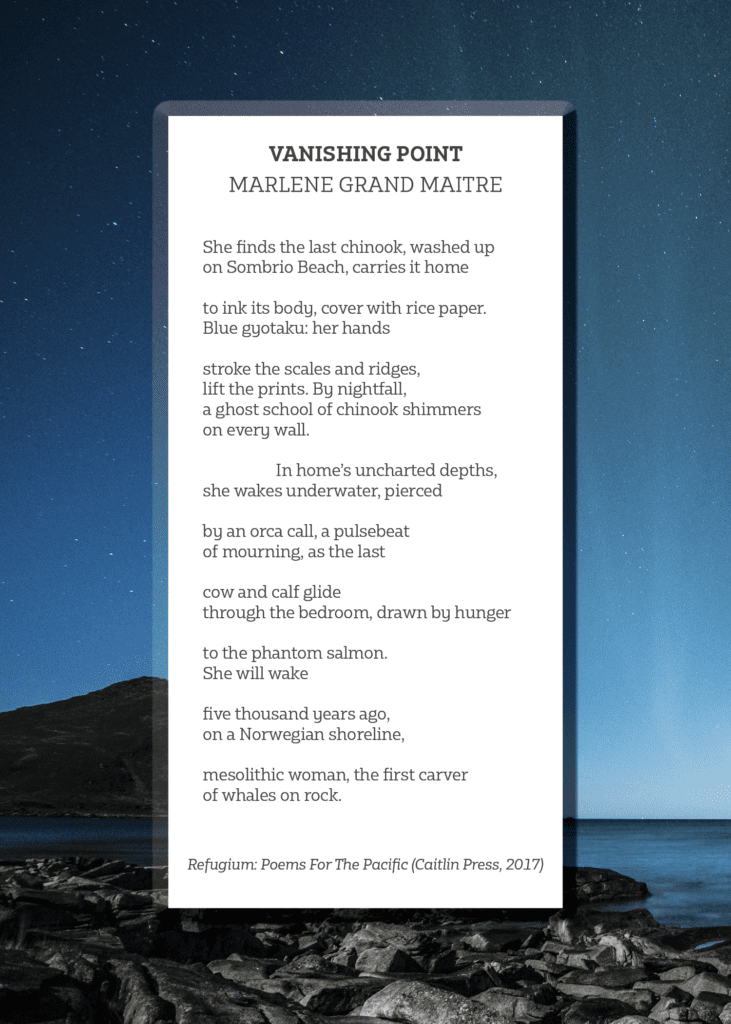
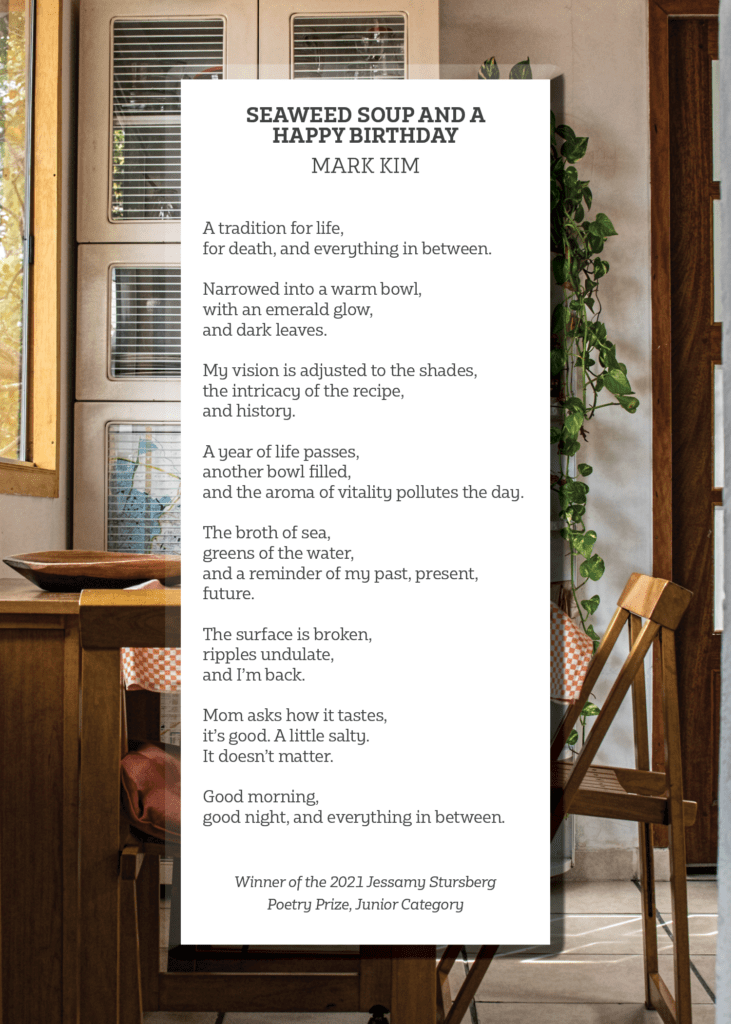
2020
by Ashley-Elizabeth Best
We started the new year by keeping our eyes open.
I tape poems to entry ways, the space above my bed,
around the couch and dinner table
talismans against the kind of people we were afraid
to become. The year miscarried its first few months
and then, throb of spring, butterflies land in the snouts
of flowers.
We hike Frontenac Provincial Park so long and hard,
my toenail peels off at the end. Bugs huff at our
necks, a frenzy of garter snakes mating in cool spaces
between granite outcroppings.
A group of Tiger Lilies at the trail head; we prayed
for stars to fall and they’ve taken up in ditches.
From the point of empty
and we begin to fill.
Originally published in Grain Magazine, Issue 48.2
Ashley-Elizabeth Best is a disabled poet and essayist from Kingston, ON. She is the author of Slow States of Collapse and Alignment.
Clepsydra
by Jaclyn Piudik
Come, let’s wash the rain
before it dies
of thirst.
Winner of the League of Canadian Poets’ 2022 Very Small Verse Contest
Jaclyn Piudik is the author of To Suture What Frays (Kelsay Books 2017) and three chapbooks, the corpus undone in the blizzard (Espresso Chapbooks 2019), Of Gazelles Unheard (Beautiful Outlaw 2013) and The Tao of Loathliness (fooliar press 2005/8). Another chapbook, Seduction: Out of Eden, written collaboratively with Janet R. Kirchheimer is forthcoming from Kelsay Books in 2022. Her poems have appeared in numerous anthologies and journals, including New American Writing, Columbia Poetry Review, Barrow Street and CV2. She received a New York Times Fellowship for Creative Writing and the Alice M. Sellers Award from the Academy of American Poets. Jaclyn holds an M.A. in Creative Writing from the City College of New York, as well as an M.A. and Ph.D. in Medieval Studies from the University of Toronto.
Famine’s Feast
by Keith Inman
A sparrow hawk swoops —
glides up to the high wire
clutching his harvest mouse
as spare row crops stoop
outside under the skies fire
crutching this hard-set house
Originally published in The Saving Bannister (2003), Synapse (2006), Canadian Cuba Literary Alliance (2013).
Keith Inman’s poetry was compared to Atwood, Boyden and Itani in Canlit 223. He generally writes about characters searching for identity. Though, he’s also written in the ‘I’ perspective, and that of a rock. His favourite class was on Joyce in Ireland; best reading, a cafe in Spain; coolest invite, LA; swankiest due, Swiss Embassy; largest reading, opening for Niagara Symphony; poignant moment, his mentor Tsigane pointing at an impressionist painting in a major gallery and saying, ‘you should write like that in your blue collar style;’ best rescue, Dr. Elspeth Cameron telling him that it is all worth it. Inman has six books of poetry published. Home is Thorold, Ontario.
For Your Head
by Maureen Hynes
make a halo, a wreath, a circlet
of bright green aspen leaves. Crown your dismal
thoughts & unruly feelings with a tiara of thyme.
Find small red things, a cranberry or rosehip or yew berry
to trim your sorrow-filled week, to be the eyes
that your eyes can’t see out of. With grass dew,
paste a rose petal on your forehead, and smear
a lick of honey on each earlobe to sweeten
whatever you hear. Breathe in jasmine scent
to intensify your memories. Pick four small leaves—
one for Fear, one for Trust, one for Rage,
the last for Desire. Lay each briefly on your tongue,
to taste but not swallow. Open your mouth
and let their power beam outward.
Maureen Hynes lives in Dish with One Spoon Wampum Belt Territory/Toronto, and has published five books of poetry. Her most recent is Sotto Voce, a finalist for the League of Canadian Poets’ Pat Lowther Award and the Golden Crown Award in poetry (U.S.) for lesbian writers. Her first book won the League’s Gerald Lampert Award, and other collections have been shortlisted for the Raymond Souster Award. Her poems have been included in over 25 anthologies, including three volumes of Best Canadian Poetry in English.
Hafez (1)
by Bänoo Zan
I stood at the gates—
The Roknabad Stream murmured through
Mosalla Gardens (2)
Roses scattered the morning breeze
The sea kissed the boat
and waved at the palace
The king smiled at sycophant ghazals
I was the bard—
the blood of the city—
the breath of God—
Centuries later they would say
that I loved Shiraz (3)
But I feared tempests
and remained true to the past
Open my book
and read your future
1. The fourteenth-century Iranian poet (ghazal writer). Iranians call him “The Mouthpiece of the Divine” and perform divinations with his Divan (collected poems). On important occasions, they form an intention or question in their mind, open the book, and interpret the ghazals on the page metaphorically according to their personal circumstances. The questions are usually about matters of significance, fate, love, etc.
2. The Roknabad Stream and Mosalla Gardens were popular outings during Hafez’s times
3. It is said that Hafez’s fame travelled beyond the boundaries of his hometown, Shiraz. A king sent him an invitation to board a ship and join his court. Hafez started preparations but in the last minute changed his mind. He is said to have never set foot outside Shiraz.
Originally published by Verse Afire A Tri-Annual Publication of the Ontario Poetry Society
Bänoo Zan is a poet, librettist, translator, teacher, editor, and poetry curator with numerous published poems as well as three books. Songs of Exile (Guernica Editions) was shortlisted for The Gerald Lampert Memorial Award by the League of Canadian Poets. Letters to My Father was published by Piquant Press. She is the founder of Shab-e She’r, Toronto’s most diverse poetry and open mic series (inception: 2012)—a brave space bridging the gap between ethnicities, nationalities, religions (or lack thereof), ages, genders, sexual orientations, disabilities, poetic styles, voices, and visions.
How to Write a Poem
by Angela Cen
Begin carefully
as you approach your writing with empirical rigor.
Dutifully perform linguistic algebra
to solve for each unknown stanza.
Slice open etymological cadavers to replicate
their emotion-generating genome.
You, a logician cloaked in artistry,
have mastered the mechanics of poetic calculus.
Stifle a sigh
when your calculations and dissections bear no fruit.
Run your tongue along self-made
foreign melodies buried in archived epics.
Feign indifference as elusive eloquence
slips through your grasp.
Swallow this dissonance
and taste the sting of a long-forgotten language.
Find solace
in literary cacophonies.
Carve a shadow out of text and
fall into its abyss.
Learn to sketch a sunrise with similes
and carve characters out of consonants.
Train your fingers to dance across a page
and leave behind a trail of words.
Etch life
into each written piece.
Hide the warmth of a friend’s laugh
behind crackling onomatopoeia.
Camouflage the memory of an old home
in frames of ornate imagery.
Immortalize moments in writing
and seal them with rhyme.
Begin again
but this time slower.
Savor the sticky-sweet sensation
of the sentences you summon.
Listen as the click-clack click of your keyboard
metronome becomes an iambic drum.
Allow your cluttered thoughts to unfurl
into rows of tidy Times New Roman.
And maybe then you’ll remember,
how to write a poem.
Winner of the 2021 Jessamy Stursberg Poetry Prize, Senior Category
Angela Cen is the winner of the 2021 Jessamy Stursberg Poetry Prize for young poets, in the senior category for grades 10, 11, and 12.
Ocean
by Callista Markotich
You who loved the daisied fields, behold this calving.
No bleat, no blood on the straw, no salt-warm lick
to life-affirming, long-legged wobble. This is ice,
her abandoned spawn, her sundering cleavages
brilliant under the sun, the thunderous drop,
the plunge, bucking and rearing in aqua
slurry, now groaning in the violence
of labour, now the slap
of spindrifts, now
susurrating
lullaby.
You who dwelt by waters-edge, look. Waist-deep your iron benches,
curlicues splash-spangled, patient as birthing chairs, laps lapping
gentle. Wet beckon: shuck your shoes, you nymphs in molt,
peel off your socks, skin-shedding serpents of the sea. Sit.
Rest in the sun-warmed shallows. Beneath the ripples,
cross your ankles, twine your calves as one,
as mermaids’ curves, your follicles
her scales. Thirty million years it
took from fins to arms and legs
to pedicures and manicures in
Pink Tutu or French. Now
glide you deep
with torque of tail,
your hair like trailing weed. From lungs
to lips to wavelets, stream your changeling song.
Slide into ocean’s turquoise hush. On your cheeks there’ll be no rime
of salt.
Callista Markotich, retired teacher, principal and Superintendent of Education, lives gratefully at the source of the great St. Lawrence River in Kingston, Ontario, on the traditional homeland of the Anishinaabe, Haudenosaunee and the Huron-Wendat. Her poems appear in Arc (Awesome Award, June 2021), Grain, Prairie Fire, Riddle Fence, The New Quarterly (Honorable Mention, Nick Blatchford Occasional Verse Contest, 2021), The Nashwaak Review, Saddlebag Dispatches, Pilgrimage, in a few ezines and anthologies, and in Room (Poetry Award, 2019).
by Harry Posner
On this Buddha quiet
Autumn morning
A bird lands
In the dead Austrian pine.
How useful will I be
After the curtain falls?
Originally Published in In The Event of True Happiness
A member of The Writers Union of Canada, and Associate Member of the League of Canadian Poets, Harry Posner is the author of six books and two spoken word CDs. Harry was Dufferin County’s Poet Laureate from 2017-2022. He organized and hosted the annual Day of the Poets festival in Orangeville, Ontario. Harry is co-host with Peter Noce of The Sill podcast (www.thesillpodcast.com), and is reachable through www.posnerbooks.com.
Seaweed Soup and a Happy Birthday
by Mark Kim
A tradition for life,
for death, and everything in between.
Narrowed into a warm bowl,
with an emerald glow,
and dark leaves.
My vision is adjusted to the shades,
the intricacy of the recipe,
and history.
A year of life passes,
another bowl filled,
and the aroma of vitality pollutes the day.
The broth of sea,
greens of the water,
and a reminder of my past, present, future.
The surface is broken,
ripples undulate,
and I’m back.
Mom asks how it tastes,
it’s good. A little salty.
It doesn’t matter.
Good morning,
good night, and everything in between.
Winner of the 2021 Jessamy Stursberg Poetry Prize, Junior Category
Mark Kim is the winner of the 2021 Jessamy Stursberg Poetry Prize for young poets, in the junior category for grades 7, 8, and 9.
Small Warblers
(after Doireann Ní Ghríofa)
by Annick MacAskill
I did not know that’s why they were there,
suddenly, and everywhere, in the trees and on
the sidewalks, inconsequential and familiar,
yet sparkling, like perfect round jewels
with the most remarkable prismatic calls. Like a brook, winding
through winter and spring, spilling
across cities and mountains and along the Atlantic
and before every window I would find. I started noticing,
as if blinking through a mist, searching,
thinking of God or romantic love, their sounds
like noise or music, and sometimes
these things were indistinguishable, as in a baby’s cry.
Their ordinariness does not diminish them.
Now I tilt my head, and listen.
Originally Published in Shadow Blight (Gaspereau Press, 2022)
Annick MacAskill’s most recent poetry collection is Shadow Blight (Gaspereau Press, 2022). She is also the author of No Meeting Without Body (Gaspereau Press, 2018), longlisted for the Gerald Lampert Memorial Award and shortlisted for the J.M. Abraham Award, and Murmurations (Gaspereau Press, 2020). Her poetry has appeared in journals across Canada and abroad, and in the Best Canadian Poetry anthology series. She is currently serving as Arc Poetry Magazine’s Poet-in-Residence. She lives in Kjipuktuk (Halifax) on the traditional and unceded territory of the Mi’kmaq.
Spatial Awareness
by Amy LeBlanc
The kitchen window is on the left
with the sink in front—
you could draw an outline in chalk,
on the cushioned tile
(with: arms, pinky toes, appendix,
intestines, hemoglobin, ferritin)
but it may not help in the end.
Turn the room on its side
to shift your heart into a new
position one where blood
either pools or flows
like a river that runs both
ways. With the room in
view, move the chair a fraction
to the right. This will place you
closer to the sun, nearer
the airport,
closer to tenderness.
On second thought, draw
the body in chalk on the floor
but make it your own. Solid lines
for impenetrable membranes,
dashes for DNA, stars for
cytokines. A space
on the left for a heart that pumps
blood toward an airplane
moving overhead.
Amy LeBlanc is Managing Editor at filling Station magazine and a PhD student at the University of Calgary. Her debut poetry collection, I know something you don’t know (Gordon Hill Press 2020) was long listed for the 2021 ReLit Award and was selected as a finalist for the Stephan G. Stephansson Award for Poetry. Her novella, Unlocking, was published by the UCalgary Press in June 2021. Her work has appeared or is forthcoming in Canadian Literature, Funicular, Room, and the Literary Review of Canada among others. Her third chapbook, Undead Juliet at the Museum, was published with ZED Press in August 2021. Amy is a recipient of the 2020 Lieutenant Governor of Alberta Emerging Artist Award and a CGS-D award for her doctoral research.
Strange Scattered Year
by Frances Boyle
I cobble together some shape like stars,
gas cloud of spangles, sensory noise
a beautiful typeface of serifed
angels and italicized galaxies. That year
declines to cohere. I’m out of practice
even at reaching for the right shelf
to take down fragments rattling
in their sealer jar. Bright ring
and clamouring disk with its ovoid dance
on tabletop or dark drift of space.
Dust of that year toxic to breathe, I need
particulate mask to filter it from my mouth
and nose. That year, melded by star-shine,
stuck to those before and aft, adhesion
of moist exhales. Trial and tributary, ribbon
of spilled milk, and I gather it in handfuls,
sop it up, recap the edgewise static,
staccato tumbling voices, and eerie dance
of half-memory. Monitor dial inching along
through situations half-heard, a moving line,
a pointing finger. Evidence in star systems
we pretend are fixed—his belt, her chair.
Try to slake my thirst with what, I believe,
is a firm grip on the ladle’s hilt.
Frances Boyle‘s third poetry collection, Openwork and Limestone, will be published by Frontenac House in fall 2022. In addition to two earlier poetry collections, she is also the author of Seeking Shade, an award-winning short story collection, and Tower, a novella. Frances’s writing has been selected for the Best Canadian Poetry series, nominated for the Pushcart Prize and Best of the Net, and appeared throughout North America and internationally. Recent and forthcoming publications include work in Blackbird, Paris Lit Up, QWERTY and The New Quarterly. She lives on unceded unsurrendered Algonquin Anishinaabe territory, colonially known as Ottawa. www.francesboyle.com.
The Hollow Tree
by Anna Yin
There are days we live
as if death were nowhere
in the background; from joy
to joy to joy, from wing to wing,
from blossom to blossom to
impossible blossom, to sweet impossible blossom.
—“From Blossoms,” Li-Young Lee
You stand at the threshold
to the west coast forest.
In the sky, wild geese align south-bound flight;
on the ground, wind gusts thresh dried leaves.
Hesitating, I shake free my windbreaker
and flesh your hollow with my warmth.
My foolhardy intention can only
bar the cold fleetingly,
I wonder what would save you
from the bitterness of blizzards
after late autumn.
The sunlight softly strokes you,
deepening our shivering shadow.
In my dream I return
to a red cedar tree, as hollow
as you. I fill in stardust
with the moss and dew
of myself—the hot harsh skin
of my despair cooling—I lay down
worldly deliberate disguises,
lips whispering to leaves of grass
in the twilight kingdom.
Trembling with tenderness,
the cedar embraces me
instilling womb-warmth.
From joy to joy, from wing to wing,
at dawn, we break into blossom.
Winner of the League of Canadian Poets 2022 National Broadsheet Contest
Anna Yin immigrated to Canada in 1999, authored five poetry collections and edited/translated Mirrors and Windows (Guernica Editions) in 2021. Anna won the 2005 Ted Plantos Memorial Award, two MARTYs, two scholarships from USA and three grants from Ontario Arts Council. Anna was appointed to be Mississauga’s Inaugural Poet Laureate in 2015. Her poems/translations have appeared at Queen’s Quarterly, ARC Poetry, New York Times, China Daily, CBC Radio, World Journal. She performed on Parliament Hill, at Austin International Poetry Festival, Edmonton Poetry Festival and universities in China, USA and Bangladesh. She teaches Poetry Alive. Her website: www.annapoetry.com
Vanishing Point
by Marlene Grand Maitre
She finds the last chinook, washed up
on Sombrio Beach, carries it home
to ink its body, cover with rice paper.
Blue gyotaku: her hands
stroke the scales and ridges,
lift the prints. By nightfall,
a ghost school of chinook shimmers
on every wall.
In home’s uncharted depths,
she wakes underwater, pierced
by an orca call, a pulsebeat
of mourning, as the last
cow and calf glide
through the bedroom, drawn by hunger
to the phantom salmon.
She will wake
five thousand years ago,
on a Norwegian shoreline,
mesolithic woman, the first carver
of whales on rock.
Originally published in Refugium: Poems For The Pacific (Caitlin Press, 2017).
Marlene Grand Maître’s chapbook, Cancer’s Rogue Season, was published by Frog Hollow Press in April 2020. Her poetry has also appeared in many literary journals, most recently in Prairie Fire, CV2, Event, and Freefall. Poems have also been published in eight anthologies, including I Found It At The Movies (Guernica, 2014), Refugium: Poems For The Pacific(Caitlin Press, 2017), Sweet Water: Poems For The Watersheds (Caitlin Press, 2020), and Voicing Suicide (Ekstasis Editions, 2020). She has won poetry prizes, and had a poem longlisted for Best Canadian Poetry In English (Tightrope Books, 2011). She can be heard reading her work online in Planet Earth Poetry’s Poets’ Caravan.
